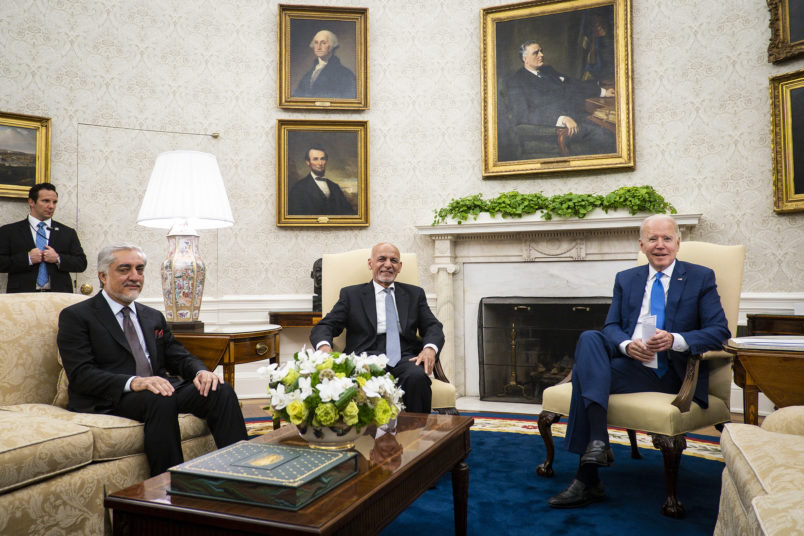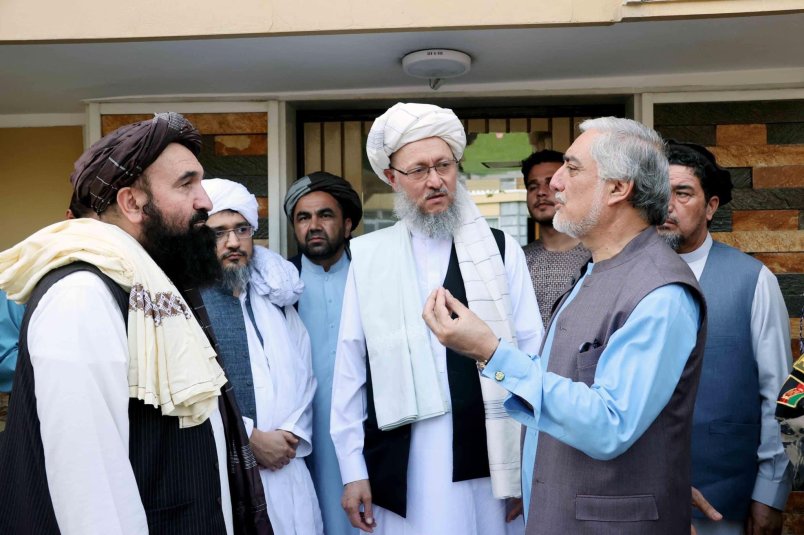The bonfire of hyperboles in US press coverage seems limitless at the moment. And the consequences of the fall of the US-backed government in Kabul are likely to be very, very limited beyond Afghanistan itself. But I wanted to focus on something that seems to be getting very, very little above-the-fold coverage in the American press coverage: the key leaders of the US backed government over the last two decades are relaxedly meeting with the political leadership of the Taliban in Kabul about the formation of the new government.
Meanwhile, Ashraf Ghani, the Afghan President whose precipitous flight hastened the rapid collapse of the government last weekend says he supports these negotiations and is in the process of negotiating his own return to the country.
He’s currently in the United Arab Emirates.
Meanwhile, Afghan media reports that Ghani’s brother, Hashmat Ghani, pledged loyalty to the Taliban and has encouraged all Afghans to do the same. I have no idea if that is in line with these negotiations or something different.
This is a tweet posted a few hours ago by Abdullah Abdullah.
Along with HE @KarzaiH, we welcomed members of the Taliban political office, & negotiation team. We exchanged views on the current security & political developments, & an inclusive political settlement for the future of the country. pic.twitter.com/360CccbBE3
— Dr. Abdullah Abdullah (@DrabdullahCE) August 21, 2021
You probably know the name of Hamid Karzai, an ethnic Pashtun who was President of Afghanistan from 2001 to 2014. Abdullah was Karzai’s Foreign Minister from 2001 to 2005. He lost in a disputed 2014 election to Ghani and then became “Chief Executive” of the country which was something like the Prime Minister and I think was part of some deal growing out of the disputed 2014 election. (His pre-2001 background was with the so-called Northern Alliance, the final holdouts against the Taliban.) This is not my area of expertise. But these three are among the most prominent leaders of the US-era government. There’s zero question about that.
Here is Abdullah meeting with President Biden in the Oval Office, along with Ghani, back on June 25th.

Now, what does this all mean? I can’t answer that question. If nothing else it reminds us that a key truth of any military occupation is that the locals live there and the occupiers don’t. They’ll be there after the foreigners are gone; a reality never lost on the people from the country. In this particular case, everyone’s interests seem pretty straightforward. Karzai, Abdullah and Ghani want some role in the new regime or at least don’t want to be on the wrong side of it. At least in the short run, stabilizing the situation is likely in everyone’s interests. The Taliban meanwhile, for all their military success, will rapidly need international recognition, access to the global banking system and access to the country’s money in US banks. All of that was cut off as soon as the former government fell. The country has rapidly gone from an importer of all manner of US and other foreign aid to being locked out of the international financial system. That will become a problem very quickly.
Whether or not the Taliban actually plan on governing differently than they did between 1996-2001, that financial need will become acute. If nothing else they likely want to have a longer tenure than they did in their first period at the helm in the country.
Does all this mean that our US-backed leaders are scurrilous turncoats jumping to secure their power and wealth under the new regime? Or do they possibly not see the whole turnover in the cataclysmic terms we seem to? I suspect it’s some of both. But I don’t know enough about the country to tell. Whichever it is seems highly relevant to how we got here and where this is going.
I flag this first because it seems highly newsworthy if we’re trying to understand just what is happening in the country. But it is remarkable to me that you can immerse yourself in the current US media coverage and as far as I can tell see very, very little discussion of this at all. I only noticed it and started digging around because I noticed Abdullah’s tweet and did some digging from there.









